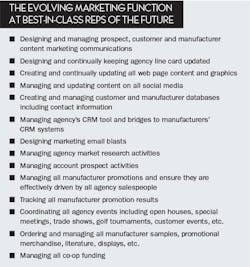Sponsored
Rep sales forces will need to be restructured and re-trained to target specific types of customers and to provide more technical product information. We think reps’ sales organizations will undergo significant restructuring within the next five years. The rep of the future will need to add technical resources that align with the products and markets upon which the rep agency plans to grow. These technical resources, in addition to supporting end users (contractors, end-users, etc.), will help them act as product/market champions to continually increase sales team technical capabilities.
Specialized field salespeople. There will be fewer outside salespeople, and those field salespeople will be highly technical, solutions-oriented and focused primarily on one channel: distribution, contractors, specifying engineers or end-users. All field salespeople will be more technically capable and solutions-oriented than their predecessors. With technology advancing so rapidly and changing consumer behavior, there’s no need for the old outside sales model. The internet has made information once only available from outside salespeople accessible to everyone. Salespeople are being invited into the purchasing process much later and by a much more informed consumer. There is a diminished need to pitch sales face-to-face. Some leading rep firms are already transitioning to this model, with more than half of their salespeople being solely engineering/specification driven. As part of this restructuring, reps will represent more services such as energy services, lighting protection, surge protection and grounding through specialized contractors and OEM panel builders.
Instead of being generalists, outside salespeople at rep firms will be demand creation specialists who will act as technical product or channel specialists, or just focus on specific customers groups (specifying engineer specialists, contractors, end users, etc.). Regardless of a new job title, any rep salesperson serving in an outside sales capacity will be highly technical and solutions oriented, fulfilling specific customer segmented needs. They will not be “SKU seekers” writing orders at distribution. To help them perform these roles more efficiently, they will need to utilize several productivity tools — CRM systems to report and harvest market data, mobile technology and web conferencing.
More technically capable inside salespeople. Inside sales teams will also need to be restructured, and there will be more technically capable inside salespeople who can provide solutions to customers. Inside salespeople will also be product managers for specific lines assigned to them. Non-selling inside activities once done by inside salespeople will be given to customer service specialists.
The most progressive reps will expect inside sales/product managers to be engines of growth. According to our research, almost universal agreement exists from manufacturers and distributors that a rep’s inside salespeople will become more important than their outside salespeople over the next five years. The ratio between inside personnel and outside personnel will shift, with the typical rep having more inside sales personnel than outside sales personnel, and their job functions will shift toward becoming inside sales/product managers. These tech-savvy, solution-centric inside salespeople will be able to execute project management and not only have in-depth product knowledge but also have superior customer service skills to ensure optimum customer satisfaction. This role will become increasingly more important over the next five years as face-to-face selling time continues to dwindle. The inside sales/product managers will negotiate and set pricing with factory approval on the products they manage; be highly educated on the technical features of the products they manage; be highly knowledgeable about what their customers need, want, and buy; and proactively sell the products they manage, including new products and higher margin products and/or manufacturer focused products.
These salespeople will be focus on customers’ needs for tracking logistics of shipments; working through their concerns with stock-outs and non-stocks; and answering their questions on terms and conditions and warranties.
Customer service specialists will take over many of the former responsibilities of inside sales personnel and they will handle most demand fulfillment functions. According to our research, these specialists will rely on technology to remove the friction points of the demand fulfillment process. Two of these technologies will be EDI and VMI (vendor managed inventory). The factoid on the previous page outlines the job function of these new customer services specialists in more detail.
The marketing function will continue to evolve. According to manufacturers who responded to the NEMRA/ FCG survey, most NEMRA rep firms do a poor job of branding their agency and promoting their manufacturers through their website, e-marketing and e-education activities. Leading manufacturers believe 50% of a rep’s marketing function should be agency branding specifically defining an agency’s unique credentials, and 50% promoting your manufacturers.
For leading, growth-oriented, share-taking manufacturers’ representatives, marketing is becoming more integral to the success of the business. The marketing function within growing rep firms is now becoming involved in strategy to support development of sales initiatives in the areas of market research, analysis and idea generation and through a broader array of deliverables ranging from the traditional (promotions, events, premiums) to differentiation and revenue generation (website management, e-commerce, new product sales, CRM, content marketing, account prospect development, etc.). The factoid on this page offers insight into these rep marketing job responsibilities.
Rep Contracts and Compensation
Reps will expect more manufacturers to adopt best-in-class compensation models. Rep complained they are experiencing significant commission shortages with some manufacturers and negative commission changes with no communication. Said one rep, “Manufacturers have succeeded in driving their administrative costs into our hands with no increase in compensation, and direct decreases in compensation the last five years.”
The rep is either an extension of the manufacturers’ sales team or in some cases is a principal’s total sales team in the field. They should be paid more along the lines of how a direct salesperson would be paid — meeting specific, documented sales objectives. As rep firms have become more involved in the project side of the business and less driven by purchase orders placed for stock business, the sales cycle for reps has lengthened.
Reps in our research study also touted “best-in-class” manufacturers who understand and financially support their reps that make additional investments in systems and sales personal to support alignment with their goals. One top manufacturer agreed: “Five years from now these ‘best-in-class’ manufacturers will have the best agents in every market, the executive said. “There will continue to be stronger alignment between these ‘best-in-class’ manufacturers and their reps from a strategic standpoint.”
With these “best-in-class” manufacturers, commission rates will increase to support reps who hire and invest in the right technical inside and outside sales personnel. The “flat commission fee will become more versatile to accommodate the additional services the representative agency will provide their manufacturers. It could be a different percent commission for each service provided by the agency or a split of gross margin that the agent is able to create above the actual cost. This would require greater transparency from manufacturers to their reps than typically exists in the electrical channel today.
Many leading manufacturers envision commissions shifting to higher rates for products requiring solution selling, while commission rates on legacy products decreasing. They also see opportunities for reps to gain short-term higher rate commission or bonuses on new products to get them specified and stocked sooner. They envision additional commissions for more work done by reps in the field, such as takeoffs, design, submittals, and project management. These tasks have typically been done by manufacturers.
Point of Sale (POS) transactions are going to get harder to accurately calculate for rep compensation as customers increase e-commerce transaction, and figuring out which rep deserves credit will become even more challenging.
Another issue is the typical 30-day contract. According to our telephone research with both manufacturers and reps, the typical 30-day contract is archaic and needs to be addressed. Many leading manufacturers support six-month to one-year contracts with termination clauses that would protect both the manufacturer and the manufacturers’ representative.
NEMRA Recommendations
According to our research, NEMRA needs to focus on four major strategic initiatives to ensure its reps are effectively prepared to provide high current and future value to the manufacturers they represent.
- NEMRA should continue to provide “best-in-class” electrical channel sales technology solutions. The association should maintain its focus on encouraging development of a more technologically capable sales force; continue developing the NEMRA Network as a CRM solution tool to integrates reps into manufacturer CRM tools; promote the distribution of sales and marketing materials via Rep Files; and push its POS/POT Initiative.
- NEMRA should develop recruitment programs to help reps attract and retain Millennials. Recommendations included continuing to promote the NEMRA Internship Process; hiring a marketing intern/co-op student from Northeastern University or another nearby college and continually employ one on NEMRA’s staff.
- NEMRA should promote the benefits for NEMRA rep agencies of hiring their own marketing interns from local universities.
- The NEMRA website should also include a profile section showcasing Millennial employees at NEMRA rep firms.
Summary. To prosper in the next few years, NEMRA reps and manufacturers must have the courage to invest in the right technologies and create work environments that will attract the workforce of the future.




